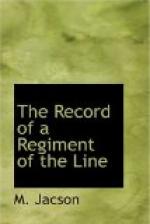Eggs per dozen, 11s. 6d.
Small vegetable marrow, 1s. 6d.
Twelve small carrots, 2s. 6d.
Small water melon (worth 1d.), 6s. 6d.
Condensed milk per tin, 5s. 6d.
Fifty-two small potatoes, L1 10s.
Chickens, each, 8s.
Ducks, 13s. 6d.
Dutch butter in tins, 6s. 6d. per lb.
1/2d. Manilla cigars, 1s.
There was no English smoking tobacco obtainable, and one bottle of whisky changed hands at L5 10s.
December 25th, Christmas Day.
“Hark, the herald angels sing!” was forcibly brought to notice by the whistling of shells passing overhead at daylight. No Divine Service was therefore held. The garrison received the following message from Her Majesty the Queen: “I wish you and all my brave soldiers and sailors a happy Christmas. God protect and bless you all.—V.R.I.” In the evening there was a soldiers’ sing-song in the lines, which was finished off by three most hearty cheers for Her Majesty. Christmas Day completed the eighth week of the siege.
The losses which the 2nd Battalion sustained at Colenso were heliographed into Ladysmith. These were 15 N.C.O.’s and 10 men killed, 72 wounded, and 33 taken prisoners. This was in addition to the officers wounded and taken prisoners already mentioned.
On December 27th, shortly after breakfast, a shell from the big gun from Bulwana pitched and burst in the officers’ mess shelter, where fourteen officers had taken cover on the whistle being blown. Lieutenant A.F. Dalzel was killed and the following were wounded:—
Lieutenant P.H. Price-Dent, dangerously in the
head.
Lieutenant Caffin, dangerously in arm and shoulder.
Lieutenant Byrne, slightly.
Lieutenant Tringham, slightly.
Lieutenant Kane, slightly.
Lieutenant Scafe, slightly.
Lieutenant Twiss, slightly.
Lieutenant Blunt, slightly.
Captain Lafone, slightly.
Private Laycock, mess waiter, slightly.
The wounded were taken into the Railway Cutting and there cared for. They were then sent down to hospital in a church in the town. Lieutenant Dalzel was buried that night in the cemetery after dark during a heavy thunderstorm and in torrents of rain.
The men had a bad experience on the night of the 29th. The rain flooded their bivouacs, and the morning found blankets and clothes floating about in the water in the trenches. Later on, however, the weather cleared, the sun came out, and everything was soon dried.
[Illustration: After a Wet Night in the Traverses, Ladysmith]
At the latter end of December marksmen were sent out daily to the hill-tops some 1000 yards in front of the line of forts to act as countersnipers to the Boers, who continually fired at the grazing guards. One man was hit twice in one day by a Boer sniper, but only slightly wounded. It would appear from a letter written by a Boer that these marksmen made it very uncomfortable for the Boer snipers. In




